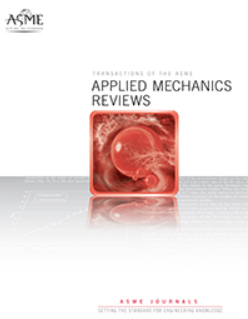Analysis of Acid Diffusion Effects on Physical Properties of Polymer Composites: A Combined Study of Mechanical and Electrical Characterization
IF 16.1
1区 工程技术
Q1 MECHANICS
引用次数: 0
Abstract
In this study, we examined the impact of carbon nanotube (CNT) concentration on the mechanical properties of epoxy/CNT composites under acid exposure. Samples with varying CNT concentrations (0% to 5%) were fabricated and characterized using dynamic mechanical analysis (DMA) and nanoindentation. Beyond the percolation threshold, the composites experienced decreased bulk mechanical properties due to CNT agglomeration. Acid exposure for one week and one month revealed a gradient of properties from the sample’s skin to its core. Overall, the composites exhibited modified physical properties, with degradation influenced by the CNT concentration. Higher concentrations acted as barriers but also created pathways for acid diffusion through pores surrounding CNT agglomerates. The agreement between nanoindentation and vector network analyzer (VNA) measurements further supported our findings. This convergence of mechanical and electromagnetic characterization techniques holds promise for wireless structural health monitoring (SHM) applications. Our study enhances the understanding of epoxy/CNT composites for SHM applications. The relationship between CNT concentration, acid exposure, and mechanical properties guides material selection and the development of real-time damage-detection techniques. Integrating multiple measurement techniques, as demonstrated by the agreement between nanoindentation and VNA data, provides a comprehensive understanding of structural behavior, improving SHM practices.酸扩散对聚合物复合材料物理性能的影响分析:力学和电学表征的结合研究
在这项研究中,我们研究了在酸暴露下,碳纳米管(CNT)浓度对环氧/CNT复合材料力学性能的影响。制备了不同碳纳米管浓度(0%至5%)的样品,并使用动态力学分析(DMA)和纳米压痕对其进行了表征。超过渗透阈值后,由于碳纳米管团聚,复合材料的整体力学性能下降。暴露在酸中一个星期和一个月显示了样品从皮肤到核心的特性梯度。总体而言,复合材料表现出物理性质的改变,降解受碳纳米管浓度的影响。较高的浓度起到屏障作用,但也为酸通过碳纳米管团聚体周围的孔隙扩散创造了途径。纳米压痕和矢量网络分析仪(VNA)测量结果之间的一致性进一步支持了我们的发现。这种机械和电磁表征技术的融合为无线结构健康监测(SHM)应用带来了希望。我们的研究增强了对环氧/碳纳米管复合材料在SHM中的应用的理解。碳纳米管浓度、酸暴露和机械性能之间的关系指导了材料的选择和实时损伤检测技术的发展。正如纳米压痕和VNA数据之间的一致性所证明的那样,集成多种测量技术可以提供对结构行为的全面理解,从而改进SHM实践。
本文章由计算机程序翻译,如有差异,请以英文原文为准。
求助全文
约1分钟内获得全文
求助全文
来源期刊
CiteScore
28.20
自引率
0.70%
发文量
13
审稿时长
>12 weeks
期刊介绍:
Applied Mechanics Reviews (AMR) is an international review journal that serves as a premier venue for dissemination of material across all subdisciplines of applied mechanics and engineering science, including fluid and solid mechanics, heat transfer, dynamics and vibration, and applications.AMR provides an archival repository for state-of-the-art and retrospective survey articles and reviews of research areas and curricular developments. The journal invites commentary on research and education policy in different countries. The journal also invites original tutorial and educational material in applied mechanics targeting non-specialist audiences, including undergraduate and K-12 students.

 求助内容:
求助内容: 应助结果提醒方式:
应助结果提醒方式:


